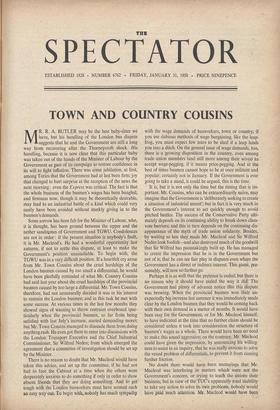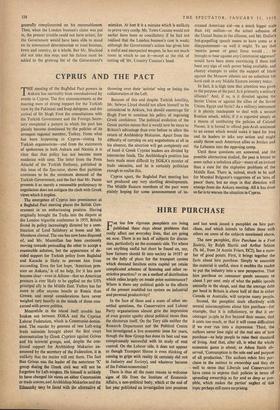TOWN AND COUNTRY COUSINS
R. R. A. BUTLER may be the best baby-sitter we
have, but his handling of the London bus dispute
suggests that he and the Government are still a long way from recovering after the Thorneycroft shock. His handling, becauSe it is now clear that this particular baby was taken out of the hands of the Minister of Labour by the Government as part of its campaign to restore confidence in its will to fight, inflation. There was some jubilation, at first, among Tories that the Government had at last been firm; joy that changed to hurt surprise at the reception of the news the next morning : even the Express was critical. The fact is that the whole business of the busmen's wages has been bungled; and firmness now, though it may be theoretically desirable, may lead to an industrial battle, of a kind which could very easily have been avoided without meekly giving in to the busmen's demands.
Some sorrow has been felt for the Minister of Labour, who, it is thought, has been ground between the upper and the nether sandstpnes of Government and TGWU. Condolences are not in order : if the present situation is anybody's fault, it is Mr. Macleod's. He had a wonderful, opportunity last autumn, if not to settle this, dispute, at least to make the Government's position unassailable. To begin with, the TGWU was in 'a very difficult position. If a heartfelt cry arose from Mr. Town Cousins about the cruel hardships of the London busmen caused by too small a differential, he would have been gleefully reminded of what Mr. Country Cousins had said last year about the cruel hardships of the provincial busmen caused by too large a differential. Mr. Town Cousins, therefore, had not unnaturally decided it was in his interest to restrain the London busmen; and in this task he met with some success. At various times in the last few months they showed signs of wanting to throw restraint overboard (par- ticularly when 'the provincial busmen, so far' &Om being satisfied with last July's increase, started demanding more); but Mr. 'Town Cousins managed to'dissuade them from doing anything rash. He even got them to enter into discussions with the London Transport Executive and the Chief Industrial Commissioner, Sir Wilfred Neden; from which emerged the agreement that a committee of investigation should be set up by the Minister.
There is no reason to doubt that Mr. Macleod would have taken this advice, and set up the committee, if he had not had to face the Cabinet at a time when the others were- desperately anxious to do something if only in order td show absent friends that they are doing something. And to get tough with the London busworkers must have seemed such an easy way out. To begin with, nobody has-much sympathy
with the wage demands of busworkers, town or country; if you use dubious methods of wage bargaining, like the leap- frog, you must expect few tears to be shed if a leap lands you into a ditch. On the general issue of wage demands, too, there is a growing disposition in the country, even among trade union members (and still more among their wives) to accept wage-pegging, if it means price-pegging. And 'at the best of times busmen cannot hope to be at once militant and popular; certainly 'not in January. If the Government is ever going to take a stand, it could be argued, this is the time.
It is; but it is not only the time but the timing that is im- portant. Mr. Cousins, who can be extraordinarily naive, may imagine that the Government is 'deliberately seeking to create a situation of industrial unrest'; but in fact it is very much in the Government's interest to act quickly enough to avoid pitched battles. The success of the Conservative Party ulti- mately depends on its continuing ability to break down class- vote barriers; and this in turn depends on the continuing dis- appearance of the myth of trade union solidarity. Besides,. -by, waiting so late they; made Mr. Macleod and Sir Wilfred Neden look foolish—and also destroyed much of the goodwill that Sir Wilfred has painstakingly built up. He has managed to create the impression that he is in the Government but not of it; that he can see fair play in disputes even where the Government has a direct or indirect interest. This game, pre- sumably, will now no farther go.
Perhaps it is as well that the pretence is ended; but there is no reason why it should have ended .the way it did; The Government had plenty of advance notice drat this dispute was brewing. When the provincial busmen won 'their un- expectedly big increase last summer it was immediately made clear by the London busmen, that they would be coming back with their own demand in a matter of months. It would have been easy for the Government, or for Mr. Macleod himself, to have indicated at the time that no further claim should be considered unless it took into consideration the structure of busmen's wages as a whole. There would have been no need to make this soundaggressive; on the contrary, Mr. Macleod could have given the impression, by announcing his willing- ness to assist in an inquiry, that he was really anxious to solve the vexed problem of differentials, to prevent it from causing 'further friction.
No doubt there would have been mutterings that Mr. Macleod was interfering in matters which 'were not the Government's concern, or trying to teach the unions their buiness; but in view of the TUC's apparently total inability to take any action to solve its 'own problems, nobody would, have paid -much attention. Mr. Macleod would have been
generally complimented on his reasonableness. Then, when the London busmen's claim was put in, the present trouble could not have arisen; for the Government would have been able to stand on its announced determination to treat busmen, town and country, as a whole. But Mr. Macleod did not take this step; and his failure must be added to the growing list of the Government's mistakes. At best it is a mistake which is unlikely to prove very costly. Mr. Town Cousins would not earlier have been so conciliatory if he had not realised that the London busmen's case is weak; although the Government's action has given him a useful and unexpected weapon, he has not much room in which to use it—except at the risk of cutting off Mr. Country Cousins's head.







































 Previous page
Previous page